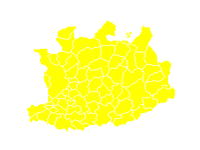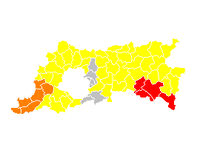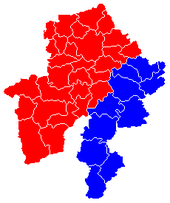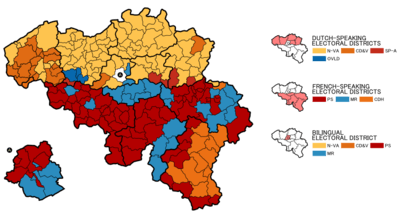Belgian federal election, 2010
| | |||||||||||||||||||||||||||||||||||||||||||||||||||||||||||||||||||||||||||||||||||||||||||||||||||||||||||||||||||||||
| |||||||||||||||||||||||||||||||||||||||||||||||||||||||||||||||||||||||||||||||||||||||||||||||||||||||||||||||||||||||
| |||||||||||||||||||||||||||||||||||||||||||||||||||||||||||||||||||||||||||||||||||||||||||||||||||||||||||||||||||||||
|
| |||||||||||||||||||||||||||||||||||||||||||||||||||||||||||||||||||||||||||||||||||||||||||||||||||||||||||||||||||||||
| Colours denote the party receiving a plurality of votes per electoral canton
* CD&V and N-VA were in a Cartel during the 2007 election; results shown for CD&V were for both parties during the 2007 election. | |||||||||||||||||||||||||||||||||||||||||||||||||||||||||||||||||||||||||||||||||||||||||||||||||||||||||||||||||||||||
| |||||||||||||||||||||||||||||||||||||||||||||||||||||||||||||||||||||||||||||||||||||||||||||||||||||||||||||||||||||||
Elections for the Federal Parliament were held in Belgium on 13 June 2010.[1] After the fall of the previous Leterme II Government over the withdrawal of Open Flemish Liberals and Democrats (Open VLD) from the government the King dissolved the legislature and called new elections. The New Flemish Alliance, led by Bart De Wever, emerged as the plurality party with 27 seats, just one more than the francophone Socialist Party, led by Elio Di Rupo, which was the largest party in the Wallonia region and Brussels.[2]
Background
Fall of the government
Following a continued lack of agreement over how to resolve the conflict over the electoral arrondissement of Brussels-Halle-Vilvoorde, the liberal Open VLD left the government on 22 April 2010, continuing the 2007–2011 Belgian political crisis. Prime Minister Yves Leterme (Christen-Democratisch en Vlaams, CD&V) immediately offered his resignation to King Albert II, who accepted it on 26 April 2010. Following the elections held on 13 June, there were fears that coalition-building may take so long that Belgium's presidency of the Council of the European Union, which starts on 1 July 2010, might have to start under a caretaker government.[3][4][5]
Constitutionality of elections
According to a statement by the Flemish President of the Constitutional Court, Marc Bossuyt, the elections might be ruled unconstitutional unless the Brussels-Halle-Vilvoorde arrondissement is split up beforehand.[6][7][8][9][10] On 4 May, all but one Flemish judge-president of the 13 Flemish Courts of First Instance wrote a collective letter, saying that the elections cannot be held with the current electoral districts and that a return to the previous electoral arrondissements is necessary.[11] In contrast, Ghislain Londers, the president of the Court of Cassation declared that all judges are obliged to cooperate with the electoral process. Before the judges' letters, former president of the Belgian Chamber of Representatives Herman De Croo stated that no court could prevent the elections from taking place.[10]
Importance of elections
The international media saw the election as crucial to determine the future of the country, even though it was admitted that devolution would not happen immediately.[12][13]
Parties

Flemish parties (Dutch speaking)
These Flemish parties field candidates in the regions of Flanders and the partially bilingual electoral district Brussels-Halle-Vilvoorde.
- New Flemish Alliance (Nieuw-Vlaamse Alliantie, N-VA) – centre-right political party, seeking secession of Flanders.
- Christian Democratic and Flemish (Christen-Democratisch en Vlaams, CD&V) – Christian democratic party with historic ties to both trade unionism and corporative organizations.
- Socialist Party – Differently (Socialistische Partij – Anders, sp.a) – social-democratic party.
- Open Flemish Liberals and Democrats (Open Vlaamse Liberalen en Democraten, open-VLD) – liberal party.
- Flemish Interest (Vlaams Belang) – seeking the independence of Flanders and strict limits on immigration.
- Green! (Groen!) – green political party.
- List Dedecker (Lijst Dedecker) – conservative-liberal party.
Walloon parties (French speaking)
These Francophone parties fielded candidates in the region of Wallonia and in the electoral district Brussels-Halle-Vilvoorde.
- Socialist Party (Parti Socialiste, PS) – social-democratic party.
- Reformist Movement (Mouvement Réformateur , MR) – liberal party.
- Humanist Democratic Centre (Centre Démocrate Humaniste, CDH) – Christian democratic party.
- Ecolo – green political party.
- People's Party (Parti Populaire) – conservative-liberal party.
Candidates
Leterme stepped aside on 28 April 2010 and was replaced as leader of CD&V by Marianne Thyssen.[14]
Notable newcomers in politics:
- Rik Torfs, former canon law professor at the Catholic University of Leuven, was on the Senate list for CD&V.
- Siegfried Bracke, former political analyst at the Flemish public broadcaster VRT was first on the Chamber list in East-Flanders for N-VA.
- Eva Brems, human rights professor at Ghent University and former president of the Flemish division of Amnesty International. She was head of the Chamber list in Flemish Brabant for Groen!.[15]
Polls
As of May 26, it appeared that the major development in the election was the surge in popularity of the N-VA in Flanders. Led by Bart De Wever, it supports eventual independence for Flanders, and an immediate switch from a federal Belgium to a confederal Belgium. The N-VA replaces the CD&V of outgoing PM Yves Leterme as the most popular party in Flanders. This development opens the question of how the francophone parties might react to forming a government with an openly sovereigntist, but politically centrist party if they do win a plurality of votes in Flanders. It appeared that the N-VA had attracted some popularity from the ethnic nationalist party, Vlaams Belang.[16]
| Flemish constituency | Francophone constituency | ||||||||||||||
|---|---|---|---|---|---|---|---|---|---|---|---|---|---|---|---|
| Date | Source | CD&V | N-VA | Open VLD | SP–A | VB | Groen! | LDD | PS | MR–FDF | CDH | Ecolo | FN | PP | RWF |
| 10 June 2007 | 2007 election | 29.6% | 18.8% | 16.3% | 19.0% | 6.3% | 6.5% | 29.5% | 31.2% | 15.8% | 12.8% | 5.6% | / | / | |
| 29 March 2010 | La Libre Belgique [17] | 20.0% | 17.8% | 13.8% | 15.5% | 17.3% | 8.1% | 5.5% | 31.7% | 20.5% | 15.5% | 20.2% | / | 4.3% | / |
| 4 May 2010 | l'Avenir[18] | 18.9% | 22.9% | 14.8% | 14.2% | 12.5% | 7.9% | 3.9% | 32.5% | 21.1% | 18.2% | 17.6% | 2.9% | <1% | 2.0% |
| 26 May 2010 | Dimarso [19] | 19.5% | 26.0% | 12.4% | 16.0% | 10.3% | 7.8% | 5.4% | |||||||
| 28 May 2010 | l'Avenir [20] | 33.0% | 20.4% | 17.0% | 17.6% | 2.5% | 1.9% | 1.9% | |||||||
| 4 June 2010 | Standaard/VRT [21] | 19.0% | 25.2% | 13.9% | 13.8% | 11.5% | 8.2% | 6.2% | |||||||
| June 2010 | La Libre Belgique [22] | 16.2% | 26% | 13.6% | 16.3% | 15% | 6.8% | 4.3% | 30% | 20.2% | 16.1% | 18.9% | 4.1% | 4.1% | / |
Results
After polls showed the N-VA receiving 29% of votes in their region, media interpreted the election as a "victory for Flemish independence."[23] The following tables contain percentages on the national level (i.e. the result of N-VA is 17.4% on the national level, while it is 27.8% on the regional level).
Chamber of Representatives

| ← 2007 • 2010 • 2014 → | |||||||||
| Abbr. | Party | Leader(s) | Votes | % | +/– | E.c. % | Seats | +/– | |
|---|---|---|---|---|---|---|---|---|---|
| N-VA | New Flemish Alliance | Bart De Wever | 1,135,617 | 17.40 | * | 28.23 | 27 | * | |
| PS | Socialist Party | Elio Di Rupo | 894,543 | 13.70 | 2.85 |
35.72 | 26 | 6 | |
| CD&V | Christian Democratic & Flemish | Wouter Beke | 707,986 | 10.85 | * | 17.60 | 17 | * | |
| MR | Reformist Movement | Charles Michel | 605,617 | 9.28 | 3.23 |
24.18 | 18 | 5 | |
| SP.A | Socialist Party – Differently | Bruno Tobback | 602,867 | 9.24 | 1.02 |
14.99 | 13 | 1 | |
| OPEN VLD | Open Flemish Liberals and Democrats | Alexander De Croo | 563,873 | 8.64 | 3.19 | 14.02 | 13 | 5 | |
| VB | Flemish Interest | Bruno Valkeniers | 506,697 | 7.76 | 4.23 | 12.60 | 12 | 5 | |
| CDH | Humanist Democratic Centre | Benoît Lutgen | 360,441 | 5.52 | 0.53 | 14.39 | 9 | 1 | |
| ECOLO | Ecolo | Jean-Michel Javaux and Sarah Turine | 313,047 | 4.80 | 0.30 | 12.50 | 8 | 0 | |
| GROEN! | Green! | Wouter Van Besien | 285,989 | 4.38 | 0.40 | 7.11 | 5 | 1 | |
| LDD | Libertarian, Direct, Democratic | Jean-Marie Dedecker | 150,577 | 2.31 | 1.72 | 3.74 | 1 | 4 | |
| PP | People's Party | Mischaël Modrikamen | 84,005 | 1.29 | new | 3.35 | 1 | new | |
| PVDA/PTB | Workers' Party | Peter Mertens | 101,088 | 1.55 | 0.71 | N/A | 0 | — | |
| Others (parties that received less than 1% of the national vote) | 215,429 | 3.29 | — | — | — | — | |||
| Valid votes | 6,527,367 | 94.19 | |||||||
| Blank and invalid votes | 402,488 | 5.81 | |||||||
| Totals | 6,929,855 | 100.00 | — | — | 150 | — | |||
| Electorate and voter turnout | 7,767,552 | 89.22 | |||||||
| Source: Federal Portal − Chamber Elections 2010. Notes: | |||||||||
Details
Results by party (seats)
| Region | Seats won per party | Total seats | |||||||
|---|---|---|---|---|---|---|---|---|---|
| Constituency | N-VA | CD&V | SP.A | VLD | VB | GROEN! | LDD | ||
Flanders |
8 / 24 |
4 / 24 |
3 / 24 |
3 / 24 |
4 / 24 |
2 / 24 |
N/A | 24 / 88 | |
3 / 9 |
2 / 9 |
1 / 9 |
2 / 9 |
1 / 9 |
N/A | N/A | 9 / 88 | ||
6 / 20 |
3 / 20 |
3 / 20 |
4 / 20 |
3 / 20 |
1 / 20 |
N/A | 20 / 88 | ||
2 / 7 |
1 / 7 |
1 / 7 |
1 / 7 |
1 / 7 |
1 / 7 |
N/A | 7 / 88 | ||
4 / 12 |
3 / 12 |
2 / 12 |
1 / 12 |
2 / 12 |
N/A | N/A | 12 / 88 | ||
4 / 16 |
4 / 16 |
3 / 16 |
2 / 16 |
1 / 16 |
1 / 16 |
1 / 16 |
16 / 88 | ||
| Total | 27 / 88 |
17 / 88 |
13 / 88 |
13 / 88 |
12 / 88 |
5 / 88 |
1 / 88 |
88 / 88 | |
| PS | MR | CDH | ECOLO | PP | |||||
Wallonia |
4 / 13 |
5 / 13 |
2 / 13 |
2 / 13 |
N/A | 13 / 62 | |||
11 / 19 |
4 / 19 |
2 / 19 |
2 / 19 |
N/A | 19 / 62 | ||||
7 / 15 |
4 / 15 |
2 / 15 |
2 / 15 |
N/A | 15 / 62 | ||||
1 / 4 |
1 / 4 |
2 / 4 |
N/A | N/A | 4 / 62 | ||||
2 / 6 |
2 / 6 |
1 / 6 |
1 / 6 |
N/A | 6 / 62 | ||||
1 / 5 |
2 / 5 |
N/A | 1 / 5 |
1 / 5 |
5 / 62 | ||||
| Total | 26 / 62 |
18 / 62 |
9 / 62 |
8 / 62 |
1 / 62 |
62 / 62 | |||
Results by electoral constituencies (percentages)
| Region | % won per party | ||||||||
|---|---|---|---|---|---|---|---|---|---|
| Constituency | N-VA | CD&V | SP.A | VLD | VB | GROEN! | LDD | Others | |
| Flanders | Antwerp | 30.71 | 15.53 | 14.32 | 11.03 | 16.15 | 7.69 | 2.29 | 2.28 |
| B.H.V. | 12.23 | 6.94 | 4.64 | 7.17 | 5.03 | * | — | — | |
| East Flanders | 28.15 | 15.40 | 14.15 | 17.40 | 12.33 | 7.36 | 3.19 | 2.04 | |
| Leuven | 27.05 | 16.26 | 17.79 | 14.51 | 9.61 | 9.79 | 3.14 | 1.86 | |
| Limburg | 28.83 | 18.81 | 18.14 | 12.10 | 12.79 | 4.81 | 2.89 | 1.62 | |
| West Flanders | 23.89 | 23.01 | 15.13 | 13.53 | 9.07 | 6.31 | 7.67 | 1.27 | |
| PS | MR | CDH | ECOLO | PP | |||||
| Wallonia | B.H.V. | 16.74 | 19.17 | 8.07 | 7.99 | — | 12.01* | ||
| Hainaut | 48.18 | 17.52 | 11.47 | 9.41 | 2.75 | 10.67 | |||
| Liège | 35.79 | 22.30 | 13.93 | 13.83 | 3.08 | 11.07 | |||
| Luxembourg | 28.49 | 19.54 | 31.41 | 11.71 | 2.44 | 6.41 | |||
| Namur | 32.20 | 24.65 | 15.92 | 13.38 | 3.12 | 10.73 | |||
| Walloon Brabant | 22.48 | 35.79 | 12.89 | 16.33 | 5.04 | 7.47 | |||
Senate
| Parties | Senate | ||||||||
|---|---|---|---|---|---|---|---|---|---|
| Votes | +/− | % | +/− | Seats | +/− | ||||
| New Flemish Alliance (Nieuw-Vlaamse Alliantie) | 1,268,780 | * | 19.61% | * | 9 | * | |||
| Socialist Party (Parti Socialiste) | 880,828 | | 13.62% | | 7 | | |||
| Christian Democratic and Flemish (Christen-Democratisch en Vlaams) | 646,375 | * | 9.99% | * | 4 | * | |||
| Socialist Party – Differently (Socialistische Partij – Anders) | 613,079 | | 9.48% | | 4 | | |||
| Reformist Movement (Mouvement Réformateur) | 599,618 | | 9.27% | | 4 | | |||
| Open Flemish Liberals and Democrats (Vlaamse Liberalen en Democraten) | 533,124 | | 8.24% | | 4 | | |||
| Flemish Interest (Vlaams Belang) | 491,547 | | 7.60% | | 3 | | |||
| Ecolo | 353,111 | | 5.46% | | 2 | | |||
| Humanist Democratic Centre (Centre Démocrate Humaniste) | 331,870 | | 5.13% | | 2 | | |||
| Green! (Groen!) | 251,546 | | 3.89% | | 1 | | |||
| List Dedecker (Lijst Dedecker) | 130,779 | | 2.02% | | 0 | | |||
| Workers' Party of Belgium (Partij van de Arbeid van België, Parti du Travail de Belgique) | 105,060 | | 1.60% | — | — | ||||
| People's Party (Parti Populaire) | 98,858 | — | 1.53% | — | 0 | — | |||
| Others | 269,588 | — | 4.17% | — | — | — | |||
| Total | 6,469,304 | 100.00% | 40 | ||||||
| Source: Federal Portal − Senate Elections 2010. Notes: * Christian Democratic and Flemish and the New Flemish Alliance contested the 2007 elections together, receiving 19.42% of the votes and 9 seats. | |||||||||
Chamber of Representatives (geographically)
These maps depict the largest party in each constituency.
Dutch-speaking constituencies




Legend:
Brussels, French- & German-speaking constituencies






Legend:
Most popular candidates
Candidates receiving the highest number of preferential votes.
For the Senate:[24]
|
For the Chamber:[25]
|
Government formation
On possible coalitions, election winner Bart De Wever announced he would seek negotiations with the Francophone Socialist Party.[26] The Socialist Party leader Elio di Rupo was tapped to become the next Prime Minister, because the socialist parties emerged as the largest "party family" in the elections, and because the New Flemish Alliance lacks a Francophone counterpart.[27][28][29]
Philip Blenkinsop of Reuters stated that the win of the New Flemish Alliance could have negative effects because "Belgium can ill afford drawn-out coalition talks because it has a large debt and any policy paralysis could make the country vulnerable on financial markets that are closely watching a sovereign debt crisis."[30]
Coalition formation continued for a record breaking 541 days, with a government under Elio De Rupo eventually being formed on 6 December 2011 after agreement was reached on the 2012 budget. The Di Rupo I Government includes the Liberal, Socialist and Christian Democratic parties from both Flanders and Wallonia. The government excludes the New Flemish Alliance (N-VA), the Greens of Groen and Ecolo, the right of Vlaams Belang, the Lijst Dedecker and the People's Party. N-VA's absence, together with the unwillingness of Open Vld to enter into an eight-party coalition that included the green parties, means the government coalition lacks a majority in the Dutch language group. It is the first time that the Belgian prime minister has been openly gay and the world's first male openly gay head of government[31] Belgium is thus the second European country to have a homosexual prime minister, after Iceland (Jóhanna Sigurðardóttir). Elio Di Rupo is the first native French-speaking prime minister since 1979 and the first Walloon prime minister since 1974.
References
- ↑ "It's a June 13th election". deredactie.be. 2010-05-05. Retrieved 2010-05-06.
- ↑ Zuvela, Matt and Connor, Richard (13 June 2010). Party supporting Belgian division claims election victory. Deutsche Welle. Retrieved 14 June 2010.
- ↑ "Belgium's government falls, future unity on line". Montreal Gazette. 2010-04-26. Archived from the original on 29 April 2010. Retrieved 2010-05-01.
- ↑ "Belgium's king accepts government's resignation". Irish Examiner. 2010-04-26. Retrieved 2010-05-01.
- ↑ "Belgischer König akzeptiert Rücktritt von Regierungschef" (in German). Nzz.ch. 2010-04-26. Archived from the original on 29 April 2010. Retrieved 2010-05-01.
- ↑ "Regierung Leterme endgültig gescheitert" (in German). Derstandard.at. 2010-04-26. Archived from the original on 29 April 2010. Retrieved 2010-05-01.
- ↑ "Verkiezingen 2009 ongrondwettelijk zonder oplossing BHV" (in Dutch). De Morgen. 2007-11-13. Retrieved 2007-11-14.
- ↑ "Geen verkiezingen zonder oplossing BHV" (in Dutch). Vrtnieuws.net. 2007-11-13. Archived from the original on 14 November 2007. Retrieved 2007-11-13.
- ↑ "Zonder oplossing BHV geen grondwettelijke verkiezingen" (in Dutch). De Standaard. 2007-11-13. Archived from the original on 14 November 2007. Retrieved 2007-11-14.
- 1 2 "Marc Bossuyt entame sa présidence en force" (in French). La Libre Belgique. 2007-11-14. Retrieved 2007-11-14.
- ↑ "Rechters hebben de plicht mee te werken aan verkiezingen" (in Dutch). Hbvl.be. 2010-05-04. Archived from the original on 7 May 2010. Retrieved 2010-05-06.
- ↑ "Unity at stake in Belgium vote - Europe". Al Jazeera English. Archived from the original on 15 June 2010. Retrieved 2010-06-15.
- ↑ "Belgians vote as breakup looms". Presstv.ir. Archived from the original on 16 June 2010. Retrieved 2010-06-15.
- ↑ "Belgian leader steps aside, early election ahead". Las Vegas Sun. 2010-05-01. Retrieved 2010-05-06.
- ↑ Bio Eva Brems – Groen! Retrieved on 2010-06-14
- ↑ Jean Quatremer (2010-05-26). "Belgique: les indépendantistes flamands ont le vent en poupe" (in French). Liberation. Archived from the original on 28 May 2010. Retrieved 2010-05-26.
- ↑ Auteur: loa (2009-04-30). "De Standaard Online - N-VA tweede grootste in peiling La Libre-RTL". Standaard.be. Retrieved 2010-06-15.
- ↑ Elections: Vers l'Avenir polls N-VA first in Flanders (in French), L'Écho, 4
- ↑ Elections: N-VA polls at 26%, first party in Flanders (in French), La DH, 27
- ↑
- ↑ TNS-Media/Dimarso poll ordered by De Standaard and VRT, 4
- ↑ IPSOS poll ordered by La Libre Belgique, Francophone results only for Wallonia, the francophone poll for Brussels is not included in these results, June
- ↑ "Belgique: victoire large et historique des indépendantistes flamands - Libération". Liberation.fr. Archived from the original on 15 June 2010. Retrieved 2010-06-15.
- ↑ Senate
- ↑ Chamber
- ↑ Keine Lösung des Sprachenstreits in Sicht. No solution for language dispute (in German). orf.at. Retrieved 14 June 2010.
- ↑ Fallon, Amy (14 June 2010). Belgian election win for party that wants to split nation. The Guardian. Retrieved 14 June 2010.
- ↑ Erdrutschsieg für flämische Separatisten. Landslide victory for flemish separatists (in German). Der Standard. Retrieved 14 June 2010.
- ↑ Belgian elections: who could be next prime minister?. The Daily Telegraph. Retrieved 14 June 2010.
- ↑ Blenkinsop, Philip. "Separatists claim victory in Belgian election". Leaderpost.com. Archived from the original on 19 June 2010. Retrieved 2010-06-15.
- ↑ Jackson, Patrick. "Profile: Belgium's Elio Di Rupo". BBC. Retrieved 8 December 2011.
External links
- Tractothèque - Electoral posters and leaflets
- NSD: European Election Database - Belgium publishes regional level election data; allows for comparisons of election results, 1991–2010






